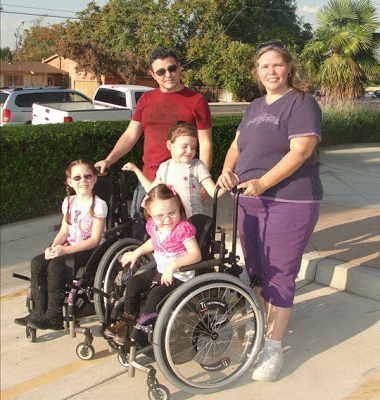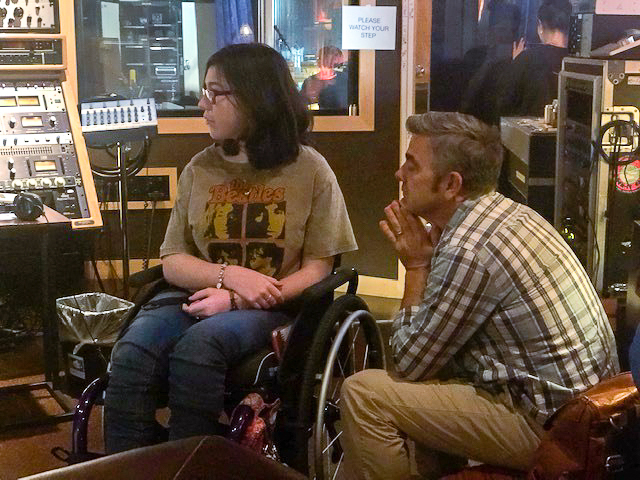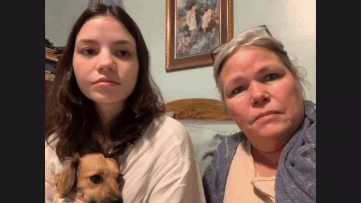On the hospital bed sat a 9-month-old baby girl. Her pale pink hospital gown barely covered her tiny legs, white ruffled socks warming her feet and a tight web of tape, wires, and an IV encircling her arm. Still, she was smiling.

A few hours earlier, this baby had a total loss of muscle control and abrupt change in demeanor. Her mom, Janice, rushed her to the hospital, knowing in her heart that something was wrong. The medical team performed an MRI and saw that something was going on - they just weren’t sure what.
Two hours later, she was improving, clapping her hands, playing with her stuffed caterpillar and attempting to crawl around. Janice breathed a sigh of relief, smiling at her daughter and watching as she seemingly turned the corner.

A knock on the door broke her reverie and the doctor’s next words broke her heart.
They told her that her 9-month-old daughter, Marissa, had vanishing white matter disease. They told her to treat every day like it was Christmas, because Marissa likely wouldn’t make it to Christmas. They told her to prepare for her child to die.
When Janice bulked at the news, when she said that couldn’t possibly be true and to look at how much Marissa had already improved, they told her she was in denial. They told her to accept reality.
Janice took her to another hospital instead.
Marissa received some more IV treatments, and while they ruled out the vanishing white matter disease, they still weren’t sure what exactly was happening. Genetic testing was inconclusive. All the while, Marissa’s development continued to decline.

Treat every day like it’s Christmas.
“It was some of the worst times of my life,” Janice told us. “And while that was happening, I had another younger daughter (Mahrynn, one year old) that also seemed like she was losing some mobility. But I kept telling myself that I was imagining things. I kept thinking, ‘No way it could be both of them.’”
At Christmastime, Janice’s parents came to visit. “My mom wasn’t even in the door for five minutes when she pulled me aside, pointed to Mahrynn and said, ‘What’s the matter.’ I knew then that I had been in denial and that I needed to seek medical advice.”

The McLaughlin family scheduled an MRI for Mahrynn’s brain and spinal cord and the results showed what they expected to be true. Mahrynn’s MRI was a mirror image of Marissa’s. “We knew then that it must be genetic and started back at zero with testing,” Janice said.
Treat every day like it’s Christmas.

One day, Janice got a call from the doctor who quickly told her to find a place to sit down. What she told her next was shocking.
A little boy named Massimo was living in Australia and had been exhibiting similar neurological symptoms. His parents paid for extensive testing and it finally led to some answers. Massimo was the first known in the world to be diagnosed with a leukodystrophy called HBSL (Hypomyelination with brainstem and spinal cord involvement).
On the phone with Janice, the doctor confirmed that Marissa and Mahrynn both had HBSL, too.

“The disease is so rare that it still has less than 25 confirmed subjects,” Janice explained. “Only four are in the U.S. and our girls are two of them. Sadly, Massimo died suddenly and unexpectedly just before Christmas a couple of years ago for reasons that are still unclear. Of course, this is any parent’s worst nightmare and we consider every morning when our girls wake up to be a blessing.”
Treat every day like it’s Christmas.
Over the years, the girls have faced their share of hurdles. Both now use wheelchairs for mobility most of the time and have undergone multiple procedures, including brain, spine, and orthopedic surgeries. A diagnosis that rare doesn’t provide a path forward; it just creates a starting point.

What their diagnosis hasn’t done is stop them from living a full life. Marissa is now 19 years old and Mahrynn just turned 15. Along with their two other sisters, Mallory and Madison, this foursome is lovingly referred to as the MacPac. They also happen to be insanely talented and creative individuals.
Marissa is into the arts, especially all things related to The Beatles. In 2018, she was surprised with Paul McCartney concert tickets and sat front and center for the entire performance. (“It was one of the greatest moments of my life,” she told us.) Marissa also loves musical theater and reading, and even writes her own screenplays.

Then there’s the youngest sister, Mahrynn. She’s mostly into songwriting, which she started exploring at the ripe old age of six. And while she fell off a horse once, she’s still pretty enthralled with horseback riding and hopes to give it another shot in the future.

The two sisters even wrote a song together about their experiences growing up as kids with disabilities, and they had the unique opportunity to record it with a recording artist. Like we said, insanely talented and creative individuals.

We asked Marissa and Mahrynn what they wished people knew about them. Without hesitation, they agreed that people making assumptions about what they can and can’t do is the absolute worst.
“A lot of the time, people will talk to us like we have an intellectual disability,” Marissa explained. “They’ll get really close to us and talk loudly and slowly like we can’t understand what they’re saying. In reality, we just use wheelchairs to get around easier.”
“Every birthday and every Christmas, I wished to be able to walk. But at the same time, I want to be able to accept myself as disabled,” Marissa told us.

The sisters put a lot of work into making that happen. From writing songs about it to sharing more of their experiences in published articles, the MacPac is all in on awareness. They even have a foundation to prove it.
Together, they’ve turned an ominous warning - “treat every day like it’s Christmas” - into one filled with hope and ambition. They approach each day like the gift that it is.
That doesn’t mean they don’t deserve some actual gifts of their own. Quite the opposite, actually.

Because of the very strict quarantining this year, the McLaughlin’s have been without OT & PT for much of the last 15 months. That directly impacted the progress they had made in strength and mobility.
“A few years back, we saw these amazing adaptive bikes at a rare disease event. Ever since then, I thought they could be the answer for our girls and help build their muscle and core strength, balance, and overall joy,” Janice explained.

“I contacted Al Leighton with Freedom Concepts to see if there were any specials or assistance that might help us make owning these bikes a reality. He sent me a quote with a note attached that said, ‘Check with Chive Charities. It’s an organization that offers assistance to families affected by rare disease.’”
They checked with Chive Charities alright. When we heard their story, we jumped at the chance to help. Adaptive bikes? You got it.
And we didn’t stop there. With two daughters in wheelchairs, the family was in desperate need of adequate transportation, and as the Oprah Winfrey of wheelchair-accessible vans (we’ve donated 175 since 2012 alone), it was on us and our incredible donor community to make that happen.

You answered with the most epic Christmas morning-esque response, and because of the selfless donations from our monthly donors, we purchased two Freedom Concepts adaptive bicycles and a new ADA van for the MacPac. The total impact: $60,000.
And like all the best Christmases, we surprised them with the news. Just take a look at this reaction:

How special is that?
If Marissa and Mahrynn have taught us anything, it’s that treating every day like it’s Christmas doesn’t have to be a dire warning. It can be a blessing that reminds you to appreciate the time you have and to make the most of it. That’s true for all of us, rare disease or not.
There are more hopeful recipients out there waiting for their own miracles - adaptive bikes, new wheelchairs, service dogs, ADA vans - the list goes on and on. With your support, we can be there for them when they need it the most. Just take it from the MacPac...we can do anything if we do it together. DONATE HERE.











































__small.jpg)










__small.jpg)






















































































_with_flag,_jason__emily_rowley-4__small.jpg)

































































































































-2__small.jpg)


























































































































































